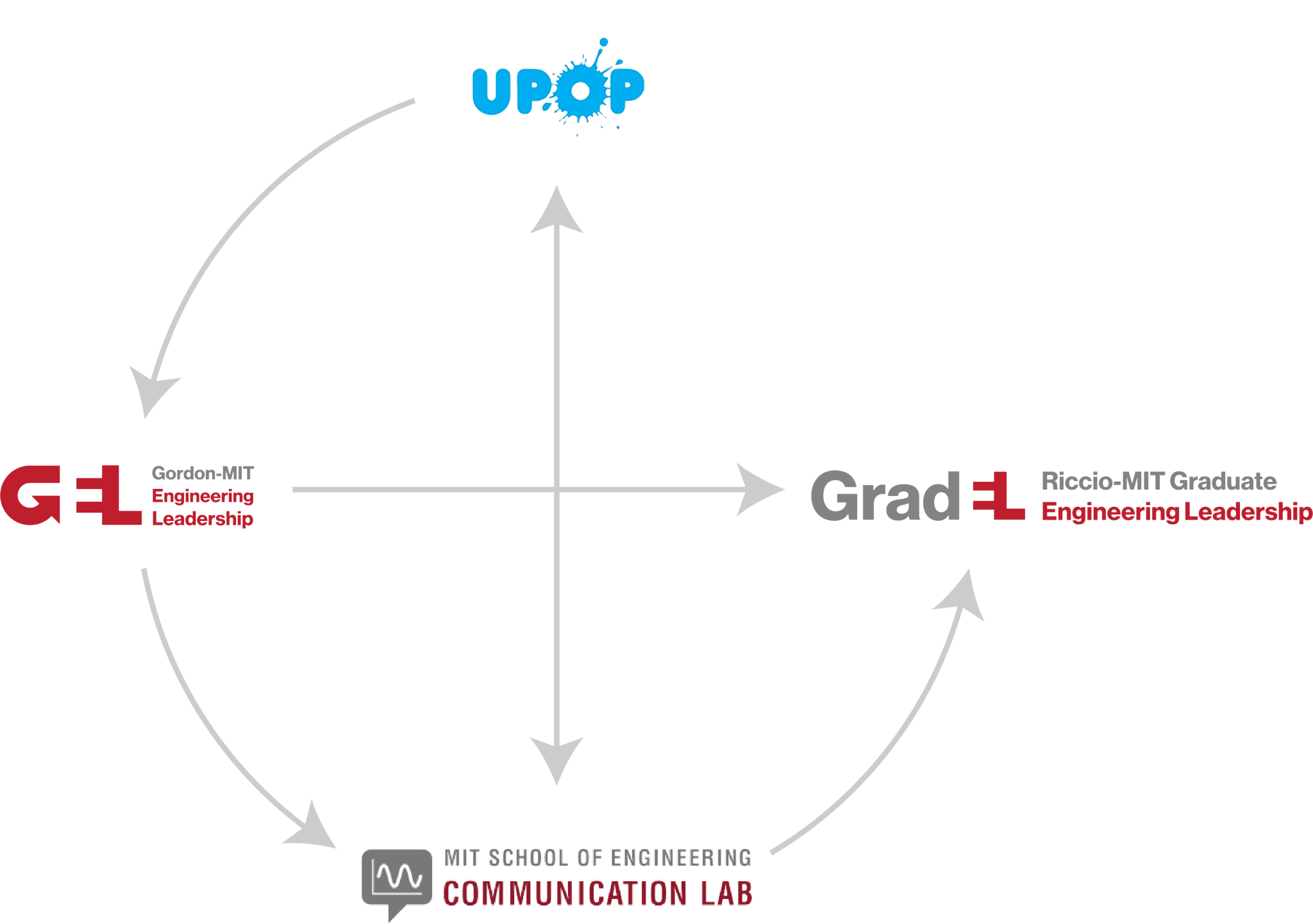Undergraduate Practice Opportunities Program
2001
Gordon-MIT Engineering Leadership
2007
MIT School of Engineering Communications Lab
2013
Riccio-MIT Graduate Engineering Leadership
2016

MIT graduates are world-renowned for their technical proficiency, but technical proficiency is not enough for scientists and engineers to solve the complex and challenging problems of our time.
Most technical universities recognize that effective leadership, collaboration and communication skills are required to turn ideas into impact. Developing these skills should be an integral part of a technical education; yet an unmet need remains.
The MIT Technical Leadership and Communication (TLC) Programs address this need by equipping students – from sophomores to postdocs – with the leadership, collaboration and communication skills that they need to succeed in the real world.
Together the TLC programs provide developmental opportunities at each stage of the MIT journey, creating a pathway to greater success and impact.
The MIT Technical Leadership and Communication (TLC) Programs develop graduates as renowned for their abilities to lead, collaborate, and communicate as they are for their technical skills. Graduates are equipped with the integrated set of capabilities necessary to tackle the greatest technical challenges of our future.
The MIT Technical Leadership and Communication (TLC) Programs strengthen students’ preparedness to thrive in their careers by facilitating learning and development of critical skills in leadership, collaboration, and communication at all stages of their MIT journey. Our programs are experiential in nature, linked to the realities of technical practice, and focused on concrete outcomes. Our programs’ alumni stand out from their peers in their ability to quickly become effective in their chosen fields and to more fully leverage their deep technical education.


Thomas Magnanti, former dean of MIT’s School of Engineering recognized that the excellent technical education provided to MIT undergraduates wasn’t enough to help them succeed in the workplace; they also needed professional development in communication, teamwork, and problem solving to truly thrive.
In response, in 2001 UPOP’s founding faculty directory, Dick Yue, and Prof Philip J. Zolondz created a one-year program to prepare MIT sophomores to enter and succeed in the professional world. Over the past two decades, UPOP has grown and now consists of seven milestone workshops focusing on core career readiness skills and a multi-day, experiential deep-dive into communication, teamwork, and problem solving. The program is a great entryway for students to participate in GEL as juniors and seniors.

Bernard M. Gordon – MIT’s first-ever National Medal of Technology recipient – and the MIT School of Engineering shared the view that, while MIT students received a world-class technical education, they need more than technical knowledge to become effective engineering leaders.
In 2007, a gift from the Bernard M. Gordon Foundation launched the Gordon-MIT Engineering Leadership Program (GEL) for MIT undergraduate students. Through practical coursework, experiential labs, and continuous feedback, GEL strengthens students’ technical knowledge with leadership, teamwork, and communication practice and skills development. GEL students emerge as next-generation engineering leaders equipped with the capabilities and character they need to effectively address complex, real-world engineering challenges.
The GEL program continues to be supported and informed by industry as it has grown to involve nearly 200 MIT undergraduate students annually.

In 2012, an exit survey in Biological Engineering (BE) revealed that nearly half of all graduating seniors identified a gap in their education – most of their time was spent on communication-oriented tasks but were lacking communication support.
In response, BE hired educational entrepreneur Jaime Goldstein. Given full autonomy and a small budget, in 2013 Goldstein founded the BE Comm Lab – a discipline-specific peer-coaching program that changed the culture of communication within the department.
Since its inception, the Comm Lab model has been sought out and adopted by almost every department within the School of Engineering as well as institutions across the country.

Building on the success of sister-program GEL, the Riccio Graduate Engineering Leadership Program was championed by David Niño in 2016 to expand engineering leadership education to the graduate level. engages with 200 graduate students from across MIT each year.
In 2022, Dan Riccio – former Apple Senior Vice President of Hardware Engineering – recognized GradEL as an opportunity to invest in the development of future engineering leaders. Riccio gifted funds to GradEL to expand its courses, workshops, internships, and certificate into a world-class program for future technical leaders. GradEL now awards over 40 Graduate Certificates in Technical Leadership and engages with 200 graduate students from across MIT each year.